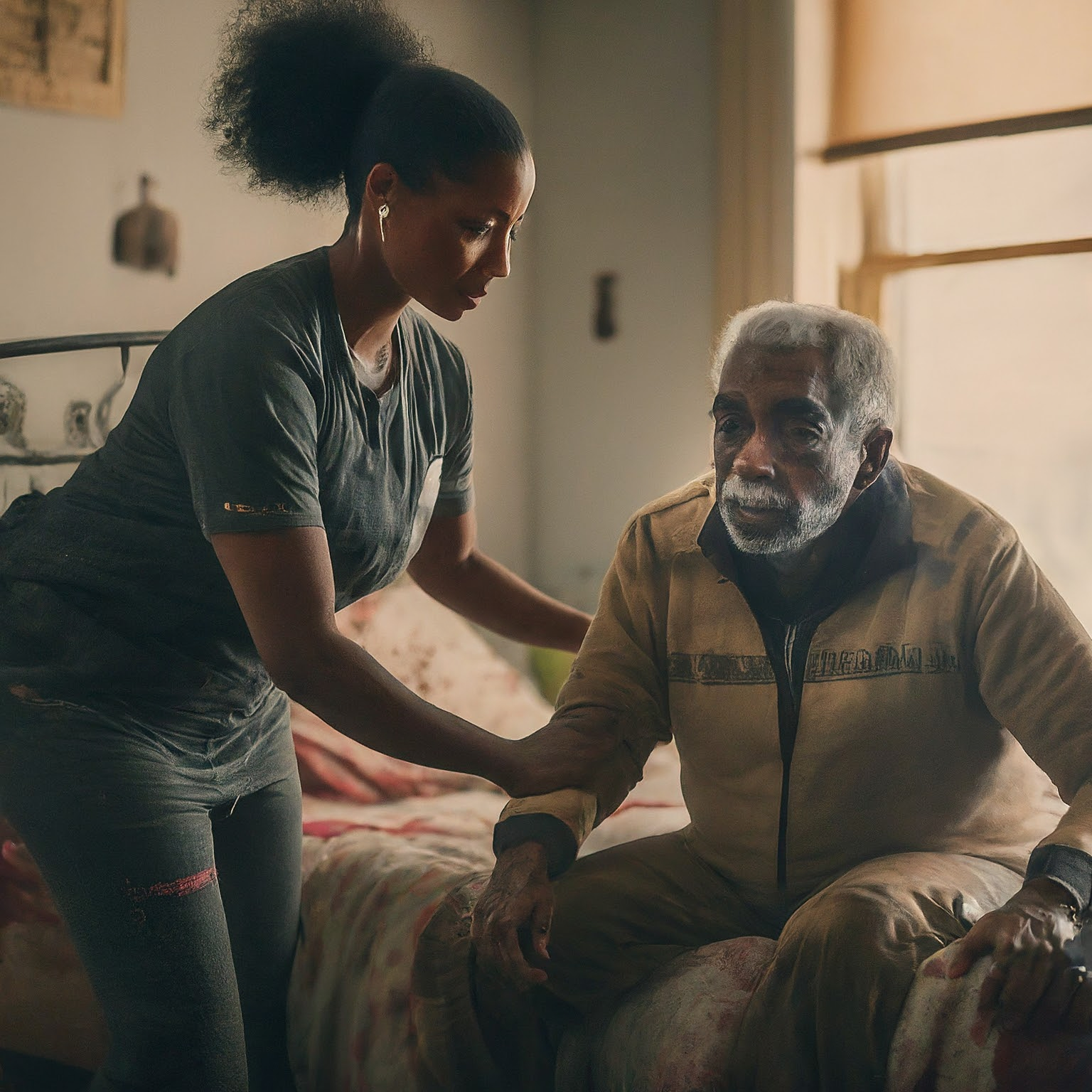For people with dementia, wandering is a serious concern, and the thought of a family member quietly slipping out the front door can be deeply unsettling. Low-cost door alarms can be life-saving tools for both individuals and their caregivers.

We explore how door alarms, contact sensors, and advanced monitoring systems can be used to keep seniors safe while maintaining their privacy.
Door Alarm and Monitoring Systems for Older Adults
| Name | Alarm Type | Features | Cost |
|---|---|---|---|
| GE Personal Security Window and Door Alarm | Door Alarm | – 120-decibel alarm – Chime or alarm mode – Tool-free installation |
$21.99 |
| Caregiver Pager Door Alarm | Door Alarm | – Variety of alarm sounds – Pairs with up to 20 sensors – LED indicator for hearing-impaired users |
$36.99 |
| SABRE 110dB Door Handle Alarm | Door Alarm | – Loud alert audible up to 680 feet away. – Three alarm settings – Portable, easy installation design |
$11.79 |
| JubileeTV | Remote Monitoring System | – App-based remote access – Automatic TV video calls – Real-time activity updates |
Plan prices vary |
| Edvbela Insoles with a hidden AirTag holder | GPS Tracking System | – Discreet tracker – Easily hidden from user – Designed for use with AirTags (not included) |
$14.59 |
| Lively Mobile2 | Medical Alert with Fall Detection | – Long-lasting battery – Optional fall detection – Waterproof |
$39.99 + service plan |
*DailyCaring may receive commissions for purchases made through links in this article.
Door Alarms Are Essential for Dementia Safety
People with dementia may try to leave home for many reasons. They might feel disoriented and not recognize their surroundings, or believe they need to get to work, school, or a previous home.
Others may be searching for a loved one, responding to a basic need like hunger or cold, or simply feeling bored or anxious. Wandering often stems from confusion, not intent, which makes proactive safety measures especially important.
A door alarm sounds when the door opens, alerting the caregiver that the person they’re looking after is leaving the house. Most door alarm sensors utilize magnets to detect when a door is opened, making them a simple yet effective solution.
Door Contact Sensors or Door Alarms?
Door sensors and door alarms may have similar job descriptions, but they serve different purposes.
Door contact sensors are typically composed of two units: one on the door and one on the frame. When the door opens or closes, the magnetic connection between the two pieces breaks, which may trigger an audible chime, send a signal to a smartphone or another device, turn on a light, or activate a camera.
Door contact sensors typically attach to the door and door frame using magnets or adhesive backing. Many smart security systems will include a door contact sensor for protection, but in the case of elderly care, door alarms may be a better option.
A door sensor can send an alert to your phone, but a door alarm will produce a sound that immediately alerts you.
You may use both for extra safety, and you may depend only on a door sensor if your loved one isn’t living with dementia, Alzheimer's, or a similar condition.
In this case, your goal will be to track the movements of your loved one rather than prevent them from going out, so a sensor will be enough.
These contact sensors are often part of DIY home security systems, offering a user-friendly way to alert homeowners when a door or window opens.
Best Door Alarms for Dementia
If you’re considering buying a door alarm, here are some of the best door alarms for individuals with dementia.
GE Personal Security Window and Door Alarm
The GE door alarm lets off a 120-decibel alarm when any door opens and a chime-like sound when any window opens. It’s easy to use, featuring a switch on the side to choose your preferred sound. It also comes in a set of four pieces to cover multiple doors. The cost is $21.99 for a four-pack .
This magnetic door alarm is part of a basic kit that easily fits on any window or door frame. A battery powers the GE alarm, and when it’s low, the LED light indicates it. It’s popular in many DIY home security systems due to its ease of installation and lack of monthly fees.
You don’t have to worry about installing this one, it comes with double-sided tape so that you can stick it to the doors and windows with no wiring needed.
Caregiver Pager Door Alarm
If you want more features in your door alarm and don’t mind paying more, the Caregiver Pager from YisTech is worth a look.
It comes with 58 preprogrammed ringtones and five adjustable volume levels, allowing you to choose the sound that makes you most comfortable. Its noise ranges from 0 dB to 110 dB.
Aside from the noise, this alarm also features an LED indicator for individuals with hearing impairments.
Like the GE alarm, it attaches to your doors and windows using double-sided tape, making it easy to install and take off.
The best part is that each receiver can pair with up to 20 door sensors, allowing you to expand its operational area without needing to purchase additional receivers. Its compatibility with multiple sensors makes it an ideal choice for larger homes with several exit doors. The system functions without a hub or complex wiring, maintaining simplicity and flexibility. The cost for the caregiver pager door alarms is $36.99 on Amazon .
SABRE 110dB Door Handle Alarm
If you're looking for an affordable option, consider the SABRE door handle alarm. Once triggered, it lets off a 110-decibel warning that’s audible up to 680 ft away. The cost is $11.79 from Amazon .
It only has three adjustable settings: off, alarm, and chime mode. The chime feature has a softer sound, so you can use it when you’re nearby.
The alarm is compact and portable, making it easy to take with you wherever you go. It also doesn’t require any wiring. It runs on AAA batteries, which are not included in the purchase.
To use this alarm, all you have to do is hang it on the inside of your door handle. This compact door alarm system is easy to carry, making it suitable for travel or temporary stays. Its loud sirens help alert homeowners or caregivers from up to 680 ft away.
Elderly Monitoring Devices
Sometimes, a door alarm isn’t enough to take care of a loved one. If you can’t stay in the house all day, it may be worthwhile to consider getting an elderly monitoring device.
Such devices or systems will allow you to start video calls on the TV if needed, record and share photos or footage, schedule medication reminders, and even enable you to drop in and hear what’s happening in another room.
Some devices will also track the person’s vitals and motion, sending alarms when something is off, like a smartwatch.
These devices can make your life so much easier, and they’ll make it more comfortable for older adults to move around and go about their day without feeling like they’re under constant supervision.
Because there’s a wide variety of monitoring devices, we’ll round up some of the best types here.
Remote Systems: For Busy Caregivers
If you’re caring for an older adult and have a job or other commitments that keep you busy, a remote system may be your best option.
A good example of a remote caregiving system is JubileeTV , which offers app-based control, allowing you to see and control everything from your phone.
Such a system will allow you to drop into certain rooms to know what’s happening without disturbing your loved one. Additionally, it’ll provide you with real-time updates, such as when your loved one turns on the TV or passes in front of a camera.
You can also use it to start calls automatically through the TV with no interaction needed.
To use a system like JubileeTV, you’ll connect it to your existing TV setup, download the app, and choose the membership you want.
Some advanced systems integrate with motion sensors, security cameras, and smart-enabled lights for enhanced security reliability.
GPS Tracking Systems: For People With Dementia
Dementia, Alzheimer’s, and similar conditions can make people disoriented, often leading to leaving the house without telling anyone.
One of the easiest GPS trackers we have seen is insoles with a hidden AirTag holder. There are a variety of them available on Amazon. These insoles from Edvbela are very reasonably priced at $14.59. They are designed for tracking people with dementia as well as kids.
A GPS tracking system connects to your smartphone. That way, you’ll have the real-time location of your loved one at all times.
GPS trackers are beneficial for individuals who may exit through exterior doors without being noticed.
Fall Detection Devices: For People With High Fall Risk
If you’re afraid your loved one may fall and not be able to call for help, an automatic fall detection device may be needed. It’ll immediately alert a monitoring center and subsequently notify you if your loved one has a fall. Some devices will also alert emergency services.
You can either use a wearable sensor device or a video camera that detects falls. Some devices, such as a Medical Alert System like Lively , can detect falls and provide GPS tracking, making your life easier. It also comes with a wireless call button in case your loved one needs help and can’t call out.
WanderGuard System: Extra Protection in Care Facilities
WanderGuard is a brand that specializes in RFID-based wander management systems, primarily used in care facilities.
These systems work by having individuals wear a small tag on their ankle or wrist. When they attempt to exit or approach an exit, a sensor detects the signal and either triggers an alert or locks the door.
These RFID-based systems often include wireless sensors placed at key entry points to detect movement. They can be part of a larger alarm system used in care facilities, usually tied into a central alarm panel for professional monitoring.
WanderGuard is a safer option than door alarms because it sends out alerts before the door opens, providing an added layer of protection. It’s designed to act preemptively, which allows for earlier intervention and injury prevention.
However, WanderGuard is mainly suited for hospitals or care facilities with multiple residents. The other options listed above may be better for a household.
Conclusion
You don’t have to forego peace of mind just because you’re taking care of someone with dementia. Numerous systems and devices can help you care for someone without intruding.
Some systems even work remotely, allowing you to go to work or do meal prep while keeping an eye on your loved one.
The good news is, you don’t have to settle for a one-size-fits-all solution. There are plenty of tools you can use together to create a greater sense of safety and keep your loved one protected.
No system is foolproof. While door alarms and monitoring tools can significantly reduce risk, they should be part of a broader safety plan. Consider combining multiple solutions to cover different scenarios and provide added peace of mind.
The post Door Alarms and Monitoring Systems for Elderly Home Safety appeared first on DailyCaring.
You might also like
CHARLIES ANGELS BLOG



